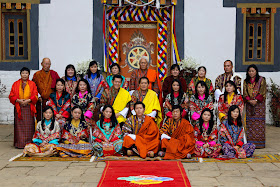At times the sun would break through; here's a closeup. The dzong is the sprawling complex at bottom, and the Ta Dzong is the similarly-styled building above it.
These oriental white-eyes were searching for their breakfast as we walked towards ours.
After breakfast we drove over to the Ta Dzong. This plaque was guarding the bottom of a stone staircase,
which leads to the entry door.
From the foot of the Ta Dzong you can appreciate how effective it was as a watchtower.
Other chillips (foreign tourists) arrived as we waited for the museum to open -- events are not always precisely timed in Bhutan. Then, after turning in our cameras or other recording equipment, we all started to watch the introductory video. A few minutes into the video the power quit, but only for 10 minutes or so, and the video was restarted.
Tshering took us through the different levels, including the top of the watchtower. There are many art and historical treasures here, such as the original raven crown of the first king. We could easily have stayed an extra half hour, but it was time to mosey, and we exited the complex from the back of the tower.
I'm thankful that Joan reminded me that my camera was still in the admittance area. Tshering dashed back and retrieved it, and then we were on the road.
This was "new orange," a term we introduced to Tshering that begs explaining. Joan and I use county-scale road maps when planning bicycle rides, and we use an orange marker to plot where we've been. Hence, a new route or road segment inspires a cry of "New Orange!" We're heading further east than we've ever been in Bhutan, towards the Bumthang district, and today specifically the Chumey valley, one of the four valleys of Bumthang. To get there we must drive over the pass of Yatong La, at an altitude of 3425 meters or about 11,200 feet.
On the way up we encountered a herd of yaks headed for a higher, summertime pasture.
They are still losing their winter coat.
At higher altitudes we also saw rhododendron in bloom.
The van passed through Yatong La and descended into the Chumey Valley. We arrived at our accommodations, the Chumey Nature Resort, for a delicious lunch. This photo is the view looking down the valley from the resort. On the left is the village of Domkhar, and on the right, a bit higher up, is the Domkhar Tashichholing (alt: Trashichoeling) palace, built in 1937 as a summer residence by the second King.
After lunch Tshering, Joan, and I took a cross-country walk down the valley. This photo looks back towards the Chumey Nature Resort, which is the complex of buildings above the bluff and at the foot of the hill. It's a tranquil setting, and we recommend the resort, its dining, and its hostess, Pema.
We made our way along fields and fence rows, making our way towards the palace. Partway along I took a view looking north towards the mountains on the other side of the valley.
Slightly further on, another view across, this time through prayer flags.
We approached the palace from the side, but swung around to the front.
Officially it's closed, but it's easy to walk about the grounds. We worked our way to the inner courtyard.
One of the princes of Bhutan was married here in 2013. For your convenience, I snatched a photo of the royal wedding contingent from the Bhutan Broadcasting Service article referenced above. The two men wearing the yellow kabney are the current and former kings, left and right respectively.
From the palace we walked down the gentle slope to Domkhar, where preparations for their annual religious festival, or tsechu, were almost complete. We were allowed to take a peek into the building where various masks and costumes for the festival were stored. This photo sequence isn't technically a panorama, but it shows three of the four walls.
Kaka met us with the van, and we rode back to the Chumey Nature Resort for dinner. We'll attend the mewang, or fire blessing ceremony, this night, and then the morning session of the tsechu. These will be the subject of my next post.


















